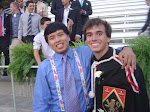So that is that. 1386 pages later I am done with both an epoch and an epic. I brought my sister Linda’s copy of War and Peace everywhere with me with the intent of finishing it before setting off for Russia. It saw the beach, a trip to Mexico (much to the amusement of the friends I traveled with), a trip to Cooperstown, countless car rides and lazy intervals between naps on the green bean bag in the playroom at home. But I wasn’t able to finish it before leaving and had no space to pack it, so I had to sadly leave for the gap year without having absorbed the last few morsels of Count Leo Tolstoy’s wisdom.
Once in Yaro, Jaime came to the rescue by pointing out that the CCS collection of books left by prior volunteers included a copy of War and Peace, which for the uninitiated charts the lives of five families of the Russian aristocracy through the two Napoleonic wars of 1805 and 1812. I stole it into our hotel room and 3 weeks later, I’m finally done.
The coolest moments to be reading the book were when real life intersected with the epic novel; the Russian army at war with Georgia in 2008 as I read about the Russian army attempting to repulse the French invaders in 1812, Tolstoy describing the Rostov family fleeing a burning Moscow for Yaroslavl, seeing the hall of 1812 dedicated to the victory over Napoleon in the Hermitage museum, and two statues at a park of Generals Barclay de Tolly and commander-in-chief Kutuzov in St. Petersburg.
If not the most entertaining, it was by the far most important book I’ve ever read. (But it was also definitely very enjoyable). Tolstoy masterfully paints a panoramic portrait of Russian life at the time, switching seamlessly from discussion of the day-to-day life of his fictional characters to his philosophy on the historical presentation of Napoleon and Tsar Alexander I.
And it is the latter of the two focuses, Tolstoy’s philosophizing, that makes me say the book is so important to me. The last 40 pages of the book, part II of the epilogue, were as dense as any textbook. Using simple examples to illustrate his points, the author lays out his beliefs in turn on the greatness and indescribable power ascribed to mere men like Napoleon by the historians of his day, the constant tug-of-war between free will (conscience) and the laws of necessity (reason), and the forces (hint: not great men or ideas alone) that move nations.
I want to end with a few quotes/excerpts that struck me as good enough to write down.
From the epilogue part II: All knowledge is simply bringing the essence of life under the laws of reason.
On the supposed greatness of men like Napoleon: And it never enters anyone’s head that to admit a greatness, immeasurable by the rule of right and wrong, is but to accept one’s own nothingness and immeasurable littleness.
Count Pierre Bezuhov asking the bigger questions in life: “What is wrong? What is right? What should one love and what should one hate? What is life? What is death? What is the power that controls it all? he asked himself. And there was no answer to any of these questions, except the one illogical reply that in no way answered them. This reply was: “One dies and it’s all over. One dies and either finds out about everything or ceases asking.”
Subscribe to:
Post Comments (Atom)


1 comment:
now what are you going to read on the beaches of Mexico? not even on the beaches, while wading in the water?!
hope all is well.
alex
Post a Comment